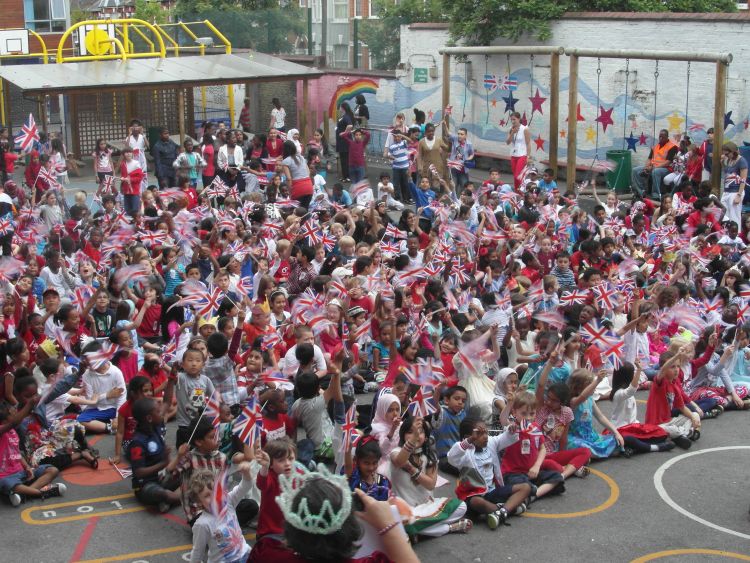British Values
British Values at Millfields
At Millfields teaching pupils about British values is an integral part of the curriculum. The rights respecting ethos and provision at Millfields, ensures that ‘being British’ in a multi-faith, multi-ethnic and mixed socio-economic community is at the heart of all we do.
British Values are defined as:
Democracy
The rule of law
Individual liberty
Mutual respect
Tolerance of those of different faiths and beliefs
(as published in June 2014 by the Department of Education)
These values are taught explicitly through Personal, Social, Health, Economic and Emotional (PSHEE), and Religious Education (RE). We also teach British values through whole school and key stage assemblies, through our “school ethos” and through delivering a broad and balanced curriculum, which includes and promotes these values. The school takes opportunities to actively promote British values through our whole school systems and structures, such as electing school council members and running a successful School Council –Article 12 Group, as well as taking part in the annual ‘Local Democracy Week’ and inviting local authority offices in to school, as well as our work on the local and general elections during our school ‘Democracy Week’.
Actively promoting British values also means challenging pupils, staff and parents to express their opinions, show their understanding of British values through school celebrations, Partnership projects, PSA events and regular feedback surveys during Parents’ Evenings.
We have a programme of assemblies that reflect British Values and British culture.

At Millfields, these values are reinforced regularly and in the following ways:
Democracy:
Democracy is an important aspect of our school values. Our Class Charters promote respect for each other, collaboration, sharing, asking questions, and understanding rights and responsibilities, which empowers the children to challenge and make decisions. Our pupils have the opportunity to express their views through the Article 12 Group (where children are selected by a class vote), pupil interviews and feedback and through their weekly PSHCE lessons. They also have the opportunity to lead in school through our Y6 Ambassador role. They advise and support other children and visitors in school every day. Also, Peer Mediators and Friendship Finders are trained and then work with playground staff to manage and support behaviour, as well as collaborate with each other to make decisions.
During 'Local Democracy Week' that takes place in October each year, we welcome local councillors to school to talk about their role in the local community, and discuss local issues with the pupils in assemblies and at an Article 12 Group meeting. Issues such as safety on the streets, the lack of goalposts in parks and are some of things that have been discussed in the past.
An email from local councillor, Margaret Gordon, in response to the pupils' questions can be read here.
During our annual 'Democracy Week', that takes place in the Summer term, pupils learn about the British Election System through looking at local, national and global issues, belonging to a party in school, electing a party leader, campaigning for a party based on their pledges, taking part in a hustings event and voting to elect a 'Prime Minister' for school. A group of pupils also act as the 'Press Team' during this week and produce a newspaper for the school community. A team cabinet is also appointed at this time.
Pupils also learn about the meaning of democracy as part of the History curriculum -Ancient Greece and exploring different societies.
We are particularly proud of how involved our pupils are with the democracy of our school.
The Rule of law:
Throughout the school year, the importance of rules, responsibility and rights is consistently reinforced. Children decide on their class standards that become their Class Charter in September each year, closely linking them to rights from the UNCRC (UN Convention on the Rights of the Child) and the school positive behaviour management system. The Class Charters and the school Positive Behaviour Management system clearly sets out consistency in terms of expectations and agreed appropriate behaviour. Children’s awareness of rules is deepened by our behaviour points system which provides evidence of the school rules, put in place at the beginning of the year, being applied. Individual awards in class, and certificates, postcards home and end of half term rewards are given to children who follow the agreed set of rules in school and display the characteristics of a good role model. Millfields’ children also understand the meaning of accountability through our ‘Restorative Justice’ approach. When solving problems and resolving conflicts children discuss the origins of the problem and its consequences, including who has been affected.
Children also explore the meaning of law. They are taught about authority figures in their local environment. In EYFS children learn about ‘People who help us’ and in KS1 about ‘The places people go’, ‘How to keep safe’ and ‘Significant people’. Through these topics children learn about the roles and responsibilities of the police, the fire service, lifeguards and the laws they follow. In KS2, children learn about customs laws, stereotypes and prejudice in their curriculum work.
We also welcome visitors in school as part of our ‘Work Week Aspirations’ assemblies, which links to awareness of law, such as a judge and a firefighter.
Some of our pupils have had the opportunity to visit the local council chambers and the Houses of Parliament and discussed laws and decision making there.
Individual liberty:
Our children are always encouraged to make choices and speak their minds. Our school environment is safe and supportive and provides children with a place where they can express themselves. In our PHSCE lessons, children lead their own learning through open discussions and choice of enquiries. They often decide their own topic of discussion and express their own feelings and ideas. Many pupils in UKS2 take part in school and inter-school Debate Challenges. Pupils are encouraged to make choices every day when choosing what to eat for lunch and in EYFS what play-based learning activity to choose.
Children are also encouraged to make choices about extra-curricular activities, project led assemblies and sometimes about the level of challenge in their work during lessons. Freedom is also discussed every year during ‘Diversity Week’. If our children find it difficult to express themselves in discussions, they can also show their personal freedom and expression through song writing, singing in music assemblies and lessons, and art (lessons or art therapy).
Our school councillors are ambassadors of the Rights Respecting School agenda, and they share their understanding of rights and responsibilities in Class Council Meetings, Article 12 Group meetings and in assemblies.
Mutual Respect
One of our core beliefs that underpins the school vision is 'respect for the rights of all'. As a multi faith, multi lingual, multicultural school, we believe that every child is free to belive what they think. At the same time, staff and parents, as part of the Millfields community show respect for one another and show admiration and appreciation for others' achievements, qualities and abilities.
Our weekly SMSC Assemblies and Celebration Assemblies promote respect and appreciation for all. It is part of our every day school ethos to care for and respect one another.
Tolerance of those of different faiths and beliefs
As an inclusive multicultural school, and a Rights Respecting School, it is part of our school ethos to respect and understand other pupils’ faiths and beliefs. This is achieved through teaching children about world faiths throughout the curriculum and through celebrating special days and festivals from our children’s religious backgrounds and others. Our assemblies celebrate and explain customs and festivals from all religious backgrounds: Islam, Hinduism, Sikhism, Buddhism, Christianity and Judaism.
We host assemblies that are led by a different religious representative e.g. the vicar from the local church, a Buddhist representative from the Buddhist centre and the Imam from the local mosque. This promotes peace between faiths and the consideration of similarities between different religions.
We follow the Hackney Agreed Syllabus for RE, which includes visits to many different religious buildings including Gurdwara, temples, churches, cathedrals, mosques and the Buddhist centre.
Our annual 'Diversity Week' promotes understanding of other people’s beliefs. Parents, children and staff share food in school, celebrate beliefs and customs from many religions and cultures through workshops, talks, assemblies and a celebration evening that always includes prefomances from a range of pupils from across diferrent cultures and faiths.
We encourage all of our children to be friends and to understand that while they may have different beliefs they can still share friendship.
We are a proudly diverse community with people of all different origins.
The promotion of British values Policy




